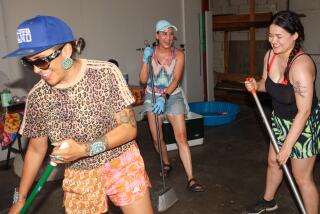New NAACP Leader Makes L.A. First Item on Agenda : Inner city: Chavis, in South-Central, urges more attention to job needs, less to predictions of violence.
- Share via
At an “April baby shower” for pregnant teen-agers, the Rev. Benjamin F. Chavis Jr. asked a question that demonstrated how much work may be ahead for the new executive director of the oldest civil rights organization in the country.
“How many of you have heard of the NAACP?” he asked.
Only a few hands were raised in the audience of nearly 100 African-American and Latino students at the Riley High School-South campus, a school for pregnant teen-agers and young mothers.
“It’s going to be a challenge,” Chavis said later. “It’s an indication of just how hard we have to work.”
The new executive director said that revitalizing the organization is one of his goals. He started his stewardship of the National Assn. for the Advancement of Colored People in Los Angeles because the eyes of the nation are focused on the city as a jury deliberates in the federal trial of the officers accused of beating Rodney G. King.
Chavis said he wanted to find out firsthand whether the city was really about to explode.
“I have not seen any indication of violence,” he said. “Not one gun. I heard no gunshots.”
After two peaceful nights in Los Angeles housing projects--Imperial Courts and Jordan Downs--on Monday and Tuesday, he began to question all the predictions of violence. He met with community leaders, talked with gang members about the truce and consulted with local NAACP chapter presidents.
“The national perception is one that officials in Los Angeles seem to be relying on law and order to solve its racial and economic inequalities,” he said. “This looks like a mini-Desert Storm. But South-Central Los Angeles is not some desert in Saudi Arabia.”
Already some of his comments have angered local leaders. Police Chief Willie L. Williams sent word to him that he was upset with the Desert Storm comparison.
Chavis, who succeeded the retiring Benjamin L. Hooks, said he came to Los Angeles because he felt the city has become a barometer of whether the nation will begin to focus its attention on the needs of the poor in inner cities.
While the attention is on the potential for renewed rioting in Los Angeles, he said, there is also an important struggle going on in Washington where a Senate filibuster has blocked the President’s jobs package.
“We want to send the message to Washington from the ‘hood in Los Angeles that people want jobs,” he said.
At the Imperial Courts housing project where Chavis spent his first night, many of the gang members were not talking about the tension of the verdicts. They worried about the lack of jobs.
George Bogard, 33, who was recently released from prison, said the frustration over the lack of work could ignite unrest.
“We want to work, we want jobs,” he said. “Most of the guys out here have become so desperate that they don’t care about themselves.”
As part of his mission, Chavis said he wants to expand the traditional focus of the NAACP to begin to “bridge the needs of the poor” with links to working- and upper-class African-Americans. Eventually, he said the organization will expand to include Latinos and Asian-Americans.
Chavis said he was invited to meet with President Clinton after his selection as director, but he turned it down and flew here.
Since 1985, Chavis has been an executive director and chief executive officer of the Commission for Racial Justice, affiliated with the 1.7-million-member United Church of Christ.
He first gained national attention as an activist in the 1970s while protesting school segregation in North Carolina. Chavis was arrested as one of the a group of activists called the Wilmington 10. He was convicted of arson and conspiracy to commit assault and sentenced to 34 years in prison. He served four years before the convictions were overturned by a federal appeals court.
At the gift-giving ceremony for the young mothers, Chavis told the audience that they are the future of the NAACP.
“You are the future of the race,” he said. “We want to make sure your insights are part of the NAACP.”
He told the young group not to let the decision of the jury in the King case change the course they have chosen for themselves. “No matter what the verdict, don’t lose hope,” he said. “Don’t let a jury determine whether you are going to be successful in life or not.”
The message was well received.
“Most people put us down because we are teen-agers and pregnant,” said Tilesha Pearson, 17. “He is telling us don’t forget your education. Be somebody. It’s good to hear that.”
More to Read
Sign up for Essential California
The most important California stories and recommendations in your inbox every morning.
You may occasionally receive promotional content from the Los Angeles Times.













